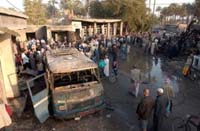
US troops backed by helicopters and a jet attacked insurgents planning a nighttime ambush near an American base north of Baghdad, killing six militants and wounding and capturing five others, the US command said Sunday.
Insurgents killed six Iraqi civilians in scattered attacks on Sunday, one day after more than two dozen people died in a truck bombing in a Shiite farming village north of Baghdad.
The surge in violence came as Iraqi political blocs unveiled their lists of candidates for Dec. 15 parliamentary elections, which the United States and its coalition partners hope will restore enough stability so they can begin bringing their forces home next year. The election commission said it has received candidate lists from 21 coalitions and from 207 other political parties or individuals.
The US operation against the insurgents was Saturday night near Taji, a US air base 12 miles north of Baghdad. Troops saw the militants moving along a canal toward a commonly used ambush site, the military said in a statement.
The militants fired on Apache attack helicopters which were conducting reconnaissance in the area. The helicopters fired back, and the insurgents retreated. When they tried to regroup, an Air Force F-15E jet dropped a 500-pound bomb on them, the military said. Six insurgents were killed and five were wounded and captured, the statement said.
On Sunday morning, a roadside bomb destroyed one of several oil tanker trucks driving on a main road in south Baghdad, sending a fire ball up over the area and killing the two men inside, police Capt. Ibrahim Abdul-Ridha said. Four civilian passers-by were wounded.
Three separate drive-by shootings in the capital killed two construction workers and wounded three; seriously wounded a shopkeeper in the Dora district; and hit a car carrying Cabinet adviser Ghalib Abdul Mahdi to work, wounding him and killing his driver, police said.
Officials also evacuated a primary school in western Baghdad on Sunday, a school day in Iraq, to defuse a bomb that was discovered by guards there, police Capt. Talib Thamir said.
In Samarra, 60 miles north of Baghdad, a roadside bomb killed a farmer on his tractor and seriously wounded two other civilians, said police Capt. Laith Mohammed.
On Saturday night, the corpses of three handcuffed and blindfolded Iraqis were found in Baghdad, and police said an Iraqi soldier and the brother of a policeman were gunned down.
Also Saturday night, a US jet dropped a bomb north of Ramadi, 70 miles west of Baghdad, killing three insurgents who were planting a roadside bomb, the military said.
A new Pentagon report estimates that 26,000 Iraqis have been killed or wounded by insurgents since Jan. 1, 2004. In the most recent period, from Aug. 29 to Sept. 16, there were an estimated 64 Iraqi casualties each day, the report said. A recent Associated Press count found that at least 3,870 Iraqis have died in the last six months.
Last week, a US military spokesman told The Associated Press that as many as 30,000 Iraqis may have died during the war, which began with the US invasion in March 2003. But independent analysts say that figure could be much higher, with estimates ranging from at least 30,000 to 100,000 or more.
At least 2,015 members of the US military also have died since the start of the Iraq war, according to an AP count, including three Army soldiers who were killed on Saturday by a land mine and a roadside bomb in two separate attacks.
Also Saturday, a bomb hidden in a truck loaded with dates exploded in the center of the Shiite farming village of Huweder, about 45 miles northeast of Baghdad, killing 26 people and injuring at least 45.
The bomb exploded as villagers were heading to the mosque for prayers or outdoors in the cool evening breeze to break the daylong fast for the holy month of Ramadan.
Police Lt. Ahmed Abdul Wahab, who gave the casualty figure, said the number of deaths could increase because several survivors were critically wounded. The village is in a religiously mixed area plagued by suicide attacks, roadside bombs and assaults on police checkpoints.
Shiite civilians are frequent targets of Sunni extremists, including the country's most feared terror group, al-Qaida in Iraq, which considers members of the majority religious community to be heretics and collaborators with US-led forces. Iraq's security services are staffed mainly by Shiites and Kurds.
(Chinadaily.com via agencies October 31, 2005)
|

